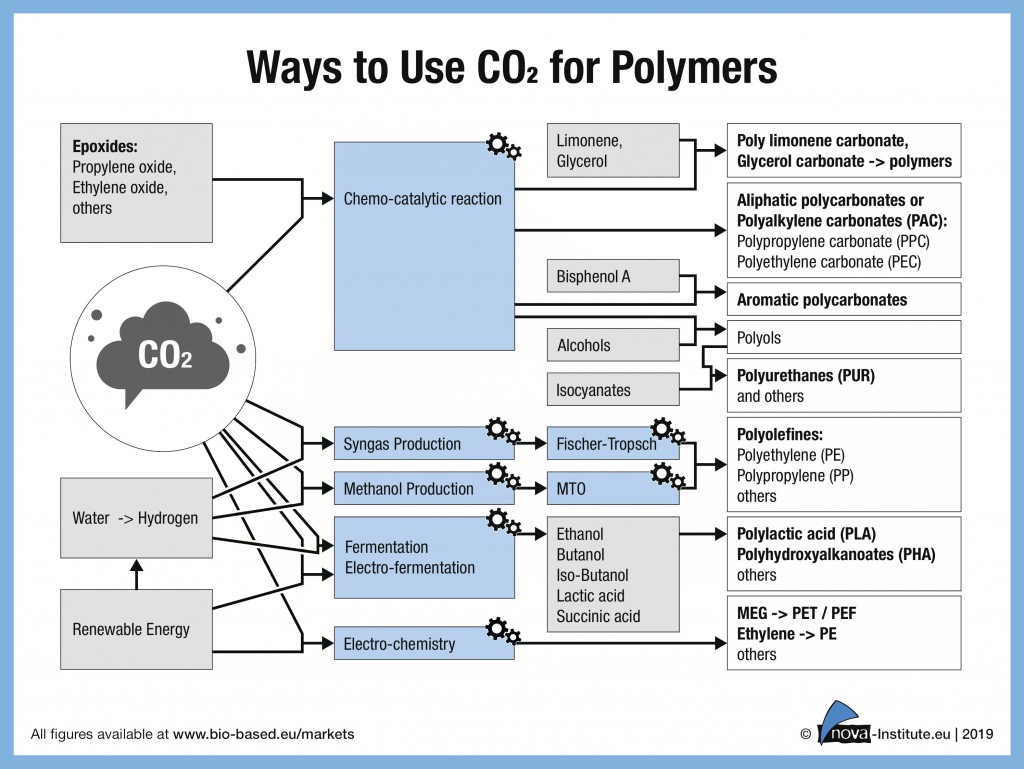nova-Institute presents a unique trend report on the utilisation of carbon dioxide (CO2) as a chemical feedstock for a wide range of polymers. The report includes the relevant technologies, polymers, developers and producers of this growing sector with high economic and sustainability potential. Additionally, it shows that already more than 160,000 tonnes of CO2-based polymers are on the market.
Deutsche Fassung: https://renewable-carbon.eu/news/marktstudie-ueber-kohlendioxid-basierte-polymere-technologien-polymere-und-produzenten/
For many, the use of carbon dioxide (CO2) with the help of renewable energies is still a novelty, although a lot of new activities arose in the last few years. Currently, most studies and investments in the area of CO2 utilisation focus primarily on fuels. This rather narrow-minded point of view misses the big potential of CO2 as a renewable and sustainable carbon feedstock for the chemical industry of the future. The organic chemistry and the polymer production cannot decarbonise, simply for the reason that carbon is the key molecule in this area – given this constraint, a renewable alternative to fossil feedstocks is needed. A large number of high-value chemicals and especially polymers can be produced from CO2 in different ways – from direct chemical or biochemical synthesis as well as from indirect use of CO2-based intermediates and building blocks.

In March 2018, nova-Institute published the first worldwide technology study on this topic: “Carbon dioxide (CO2) as a chemical feedstock for polymers – technologies, polymers, developers and producers” which has now been updated comprehensively. The study investigates from a technological point of view which polymers can be produced from CO2 and provides an overview of the polymers that have already been developed, produced and marketed and by which companies.
The report goes into detail about various opportunities to produce building blocks and polymers based on CO2 via different pathways: Chemical catalytic processes are used to produce chemicals such as aromatic phosgene-free polycarbonates (PC) or aliphatic polycarbonates (APC) like polypropylene carbonate (PPC), polyethylene carbonate (PEC), polylimonene carbonate (PLimC) and polyurethanes (PUR) that are synthesised with CO2-based polyols. Biotechnological approaches – fermentation of CO2 or CO2-rich syngas (generally containing carbon monoxide (CO), CO2 and hydrogen (H2)) via microorganisms like bacteria, algae and cyanobacteria – lead to building blocks such as lactic acid or succinic acid, from which polymers like polylactic acid (PLA) or polybutylene succinate (PBS) can be made. Polyhydroxyalkanoates (PHAs) are polymers which can be directly derived by fermentation of CO2 without any intermediate building blocks. Electrochemical pathways, for example to monoethylene glycol (MEG), which is used for the production of polyethylene terephthalate (PET), are also described in the report. Additionally, the use of CO2-based methanol as a feedstock is an alternative route to produce olefins via an already established process, the “Methanol to Olefin (MTO)” process. Also, a huge potential lies in the so-called “Blue Crude” oil substitute that can be produced via a Fischer-Tropsch synthesis from syngas and directly substitute crude oil in a refinery for the production of conventional fuels, chemicals and polymers as drop-ins based on a renewable carbon feedstock.
First pilot demonstration and commercial production plants are already installed in which CO2 is used either directly as a building block for polymers or indirectly in combination with other, non-CO2-derived monomers to obtain a large array of plastics with tailor-made properties. The report describes at least 30 companies from Asia, Europe and North America are already working on a large number of CO2-based polymers and plastics – leading to a total of more than 160,000 tonnes of CO2-based polymers already on the market.
 The updated report “Carbon dioxide (CO2) as chemical feedstock for polymers – technologies, polymers, developers and producers” was written by Achim Raschka, Pia Skoczinski, Jan Ravenstijn and Michael Carus. The report is available for 1,000 € at www.bio-based.eu/reports, for which you will receive a technology and market report on a completely new and growing sector with high economic and sustainability potential. If you would like to get a first impression about the contents of the report, you can access a preview of the entire report for free at http://bio-based.eu/download/?did=166097&file=0.
The updated report “Carbon dioxide (CO2) as chemical feedstock for polymers – technologies, polymers, developers and producers” was written by Achim Raschka, Pia Skoczinski, Jan Ravenstijn and Michael Carus. The report is available for 1,000 € at www.bio-based.eu/reports, for which you will receive a technology and market report on a completely new and growing sector with high economic and sustainability potential. If you would like to get a first impression about the contents of the report, you can access a preview of the entire report for free at http://bio-based.eu/download/?did=166097&file=0.
Press release as PDF file: 19-02-28 PR New study on CO2 polymers
Source
nova-Institut GmbH, press release, 2019-02-28.
Supplier
Share
Renewable Carbon News – Daily Newsletter
Subscribe to our daily email newsletter – the world's leading newsletter on renewable materials and chemicals










